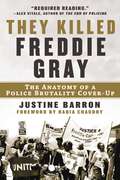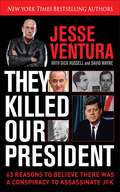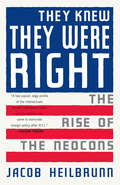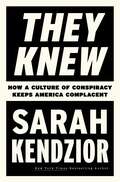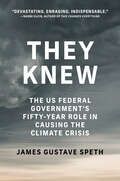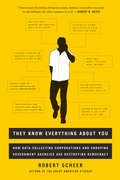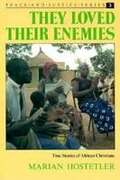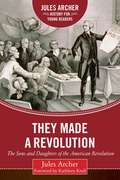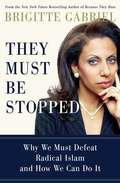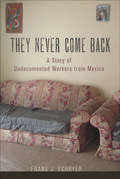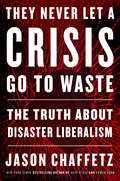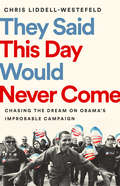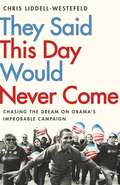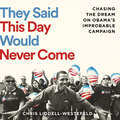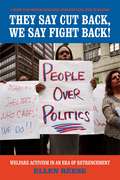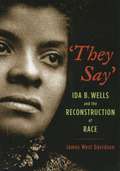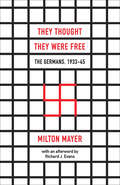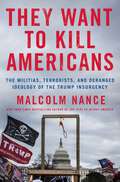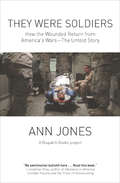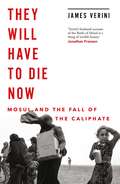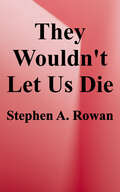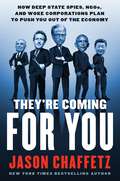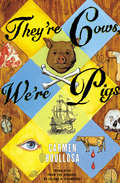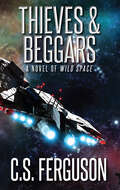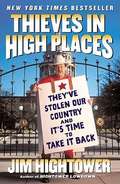- Table View
- List View
They Killed Freddie Gray: The Anatomy of a Police Brutality Cover-Up
by Justine BarronBased on new evidence and deep reporting, the riveting truth about a case that has become a touchstone in the struggle for racial justice and Black lives.They Killed Freddie Gray exposes a conspiracy among Baltimore leaders to cover up what actually happened to Freddie Gray, who was fatally injured in police custody in April 2015. After Gray&’s death, Baltimore became ground zero for Black Lives Matter and racial justice protests that exploded across the country. State&’s Attorney Marilyn Mosby became a hero when she charged six officers in Gray&’s death, and the trials of the officers generated national headlines for two years. Yet the cause of Gray&’s death has remained a mystery. A viral video showed an officer leaning on Gray&’s back while he cried out in pain. But the autopsy concluded he was fatally injured later that morning while the van was in motion—during a multi-stop &“rough ride&”—from sudden impact to his head. None of the officers were convicted of any crimes based on this theory. They Killed Freddie Gray solves the mystery of Gray&’s death by uncovering new evidence of how he was killed by police and how his cause of death was covered up. In coordination with a documentary film now being produced, this book revisits a pivotal moment in US criminal justice history, providing new insight into what happened, the historical structures of power that allowed it to happen, and the personalities and dynamics involved—a story never told by the mainstream media. It includes a detailed map with annotations by the author, photographs, and a foreword by Rabia Chaudry.
They Killed Our President: 63 Reasons to Believe There Was a Conspiracy to Assassinate JFK
by Jesse Ventura Dick Russell David WayneUnless you've been living under a rock for the past fifty years, you're aware of the many hypotheses that the assassination of President John F. Kennedy was not done by one man. Whether you've read one or a dozen of the books on this topic, there's no way to fully grasp the depth of this conspiracy. For the first time ever, New York Times bestselling authors Jesse Ventura and Dick Russell have teamed up with some of the most respected and influential assassination researchers to put together the ultimate compendium that covers every angle--from the plot to the murder--of JFK. They Killed Our President will not only discuss the most famous of theories, but will also bring to light new and recently discovered information, which together shows that the United States government not only was behind this egregious plot, but took every step to make sure that the truth would not come out.With 2013 marking the fiftieth anniversary of JFK's assassination, this is the perfect time for They Killed Our President to be available to readers. The research and information in this book are unprecedented, and there's nobody better to bring this to everyone's attention than the former governor of Minnesota and US Navy SEAL, Jesse Ventura.
They Knew They Were Right: The Rise of the Neocons
by Jacob HeilbrunnThe neocons have become at once the most feared and reviled intellectual movement in American history. Critics on left and right describe them as a tight-knit cabal that ensnared the Bush administration in an unwinnable foreign war. Who are the neoconservatives? How did an obscure band of policy intellectuals, left for dead in the 1990s, suddenly rise to influence the Bush administration and revolutionize American foreign policy? Jacob Heilbrunn wittily and pungently depicts the government officials, pundits, and think-tank denizens who make up this controversial movement, bringing them to life against a background rich in historical detail and political insight. Setting the movement in the larger context of the decades-long battle between liberals and conservatives, first over communism, now over the war on terrorism, he shows that they have always been intellectual mavericks, with a fiery prophetic temperament (and a rhetoric to match) that sets them apart from both liberals and traditional conservatives. Neoconservatism grew out of a split in the 1930s between Stalinists and followers of Trotsky. These obscure ideological battles between warring Marxist factions were transported to the larger canvas of the Cold War, as over time the neocons moved steadily to the right, abandoning the Democratic party after 1972 when it shunned intervention abroad, and completing their journey in 1980 when they embraced Ronald Reagan and the Republican party. There they supplied the ideological glue that held the Reagan coalition together, combining the agenda of “family values” with a crusading foreign policy. Out of favor with the first President Bush, and reduced to gadflies in the Clinton years, they suddenly found themselves in George W. Bush’s administration in a position of unprecendented influence. For the first time in their long history, they had their hands on the levers of power. Prompted by 9/11, they used that power to advance what they believed to be America’s strategic interest in spreading democracy throughout the Arab world. Their critics charge that the neo-conservatives were doing the bidding of the Israeli government -- a charge that the neoconservatives rightfully reject. But Heilbrunn shows that the story of the neocons is inseparable from the great historical drama of Jewish assimilation. Decisively shaped by the immigrant exerience and the trauma of the Holocaust, they rose from the margins of political life to become an insurgent counter-establishment that challenged the old WASP foreign policy elite. Far from being chastened by the Iraq debacle, the neocons continue to guide foreign policy. They are advisors to each of the major GOP presidential candidates. Repeatedly declared dead in the past, like Old Testament prophets they thrive on adversity. This book shows where they came from -- and why they remain a potent and permanent force in American politics. From the Hardcover edition.
They Knew: How a Culture of Conspiracy Keeps America Complacent
by Sarah KendziorFINALIST FOR THE LOS ANGELES TIMES BOOK PRIZE “Every sentence delivered. The pathos of truth-seeking left me thinking of Herman Melville."—Timothy Snyder, #1 New York Times bestselling author of On TyrannyNEW YORK TIMES BESTSELLING author Sarah Kendzior delves into the difference between conspiracy and conspiracy theory, "deftly separat[ing] fact from fiction in a conspiracy-addled nation" (VANITY FAIR).Conspiracy theories are on the rise because officials refuse to enforce accountability for real conspiracies. Uncritical faith in broken institutions is as dangerous as false narratives peddled by propagandists.The truth may hurt—but the lies will kill us.They Knew discusses conspiracy culture in a rapidly declining United States struggling with corruption, climate change, and other crises. As the actions of the powerful remain shrouded in mystery—“From Norman Baker to Jeffrey Epstein, Iran-Contra to January 6" (VF)—it is unsurprising that people turn to conspiracy theories to fill the informational void. They Knew exposes the tactics these powerful actors use to placate an inquisitive public.Here, for the first time, Kendzior blends her signature whip-smart prose and eviscerating arguments with lyrical and intimate examinations of the times and places that haunt American history. "America is a ghost story," writes Kendzior, as she unearths decades of buried history, providing an essential and critical look at how to rebuild our democracy by confronting the political lies and crimes that have shaped us.
They Knew: The US Federal Governments Fifty-Year Role in Causing the Climate Crisis
by James Gustave SpethA devastating, play-by-play account of the federal government's leading role in bringing about today's climate crisis.In 2015, a group of twenty-one young people sued the federal government for violating their constitutional rights by promoting the climate catastrophe, depriving them of life, liberty, and property without due process of law. They Knew offers evidence for their claims, presenting a devastating, play-by-play account of the federal government's role in bringing about today's climate crisis. James Speth, tapped by the plaintiffs as an expert on climate, documents how administrations from Carter to Trump--despite having information about climate change and the connection to fossil fuels--continued aggressive support of a fossil fuel based energy system. What did the federal government know and when did it know it? Speth asks, echoing another famous cover up. What did the federal government do and what did it not do? They Knew (an updated version of the Expert Report Speth prepared for the lawsuit) presents the most compelling indictment yet of the government's role in the climate crisis, showing a forty-year failure to take action. Since Juliana v. United States was filed, the federal government has repeatedly delayed the case. Yet even in legal limbo, it has helped inspire a generation of youthful climate activists. An Our Children&’s Trust Book
They Know Everything About You: How Data-Collecting Corporations and Snooping Government Agencies Are Destroying Democracy
by Robert Scheer Sara BeladiThey Know Everything About You is a groundbreaking exposé of how government agencies and tech corporations monitor virtually every aspect of our lives, and a fierce defense of privacy and democracy. The revelation that the government has access to a vast trove of personal online data demonstrates that we already live in a surveillance society. But the erosion of privacy rights extends far beyond big government. Intelligence agencies such as the NSA and CIA are using Silicon Valley corporate partners as their data spies. Seemingly progressive tech companies are joining forces with snooping government agencies to create a brave new world of wired tyranny. Life in the digital age poses an unprecedented challenge to our constitutional liberties, which guarantee a wall of privacy between the individual and the government. The basic assumption of democracy requires the ability of the individual to experiment with ideas and associations within a protected zone, as secured by the Constitution. The unobserved moment embodies the most basic of human rights, yet it is being squandered in the name of national security and consumer convenience. Robert Scheer argues that the information revolution, while a source of public enlightenment, contains the seeds of freedom’s destruction in the form of a surveillance state that exceeds the wildest dream of the most ingenious dictator. The technology of surveillance, unless vigorously resisted, represents an existential threat to the liberation of the human spirit.
They Loved Their Enemies: True Stories of African Christians
by Marian HostetlerMarian Hostetler tells the stories of many kinds of people -- young and old, male and female, leaders and ordinary folk. There are stories of people from 1,700 years ago and those from recent years. The stories come from across the continent of Africa, from Algeria to South Africa, from Sierra Leone to Kenya. Volume 3.
They Made a Revolution: The Sons and Daughters of the American Revolution (Jules Archer History for Young Readers)
by Kathleen Krull Jules ArcherThe founding fathers and mothers of the United States were not, as history often makes them out to be, stuffy cardboard figures of virtue and nobility. They Made a Revolution introduces them as the real people they were-complete with their inevitable flaws and weaknesses. Through their letters, diaries, and reminiscences, discover what was going on in the minds of this country’s revolutionary leaders as they committed treason against the most powerful nation on earth, risking their lives for the sake of freedom. Meet "The Sly Fox,” Sam Adams; "The Rich Rebel,” John Hancock; "The Silver-Tongued Bumpkin,” Patrick Henry; and the very brave Abigail Adams and full-of-secrets Martha Washington. Each of these characters comes alive in this fabulous collection of historical biographies.These are the stories of the courageous men and women who stood up to the British king and made a revolution happen. To England, they were traitors. To the United States, they became patriots.
They Must Be Stopped: Why We Must Defeat Radical Islam and How We Can Do It
by Brigitte GabrielThey Must Be Stopped is New York Times bestselling author Brigitte Gabriel's warning to the world: We can no longer ignore the growth of radical Islam--we must act soon, and powerfully. Gabriel challenges our western and politically-correct notions about Islam, demonstrating why radical Islam is so deadly and how we can halt its progress. Brigitte Gabriel speaks her mind:* Fundamentalist Islam is a religion rooted in 7th century teachings that are fundamentally opposed to democracy and equality.* Radical Islamists are utterly contemptuous of all infidels (non-Muslims) and regard them as enemies worthy of death.* Madrassas in America are increasing in number, and they are just one part of a growing radical Islamic army on US soil.* Radical Islam exploits the US legal system and America's protection of religion to spread its hatred for western values.* America must organize a unified voice that says 'enough to political correctness, and demands that government officials and elected representatives do whatever is necessary to protect us. Brigitte Gabriel has fearlessly faced down critics, death threats, and political correctness, and is one of the most sought after terrorism experts in the world. They Must Be Stopped is her clarion call to action. Gabriel thoroughly addresses the historical and religious basis of radical Islam, its frightening encroachment into societies around the world, and its abuses of democracy in the name of religion.
They Never Come Back: A Story of Undocumented Workers from Mexico
by Frans J. SchryerFor Mexicans on both sides of the border, the migrant experience has changed significantly over the past two decades. In They Never Come Back, Frans J. Schryer draws on the experiences of indigenous people from a region in the Mexican state of Guerrero to explore the impact of this transformation on the lives of migrants. When handicraft production was able to provide a viable alternative to agricultural labor, most migrants would travel to other parts of Mexico to sell their wares. Others opted to work for wages in the United States, returning to Mexico on a regular basis. This is no longer the case. At first almost everyone, including former craft vendors, headed north; however it also became more difficult to go back home and then reenter the United States. One migrant quoted by Schryer laments, "Before I was an artisan and free to travel all over Mexico to sell my crafts. Here we are all locked in a box and cannot get out." NAFTA, migrant labor legislation, and more stringent border controls have all affected migrants' home communities, their relations with employers, their livelihoods, and their identity and customs. Schryer traces the personal lives and careers of indigenous men and women on both sides of the border. He finds that the most pressing issue facing undocumented workers is not that they are unable to earn enough money but, rather, that they are living in a state of ongoing uncertainty and will never be able to achieve their full potential. Through these stories, Schryer offers a nuanced understanding of the predicaments undocumented workers face and the importance of the ongoing debate around immigration policy.
They Never Let a Crisis Go to Waste: The Truth About Disaster Liberalism
by Jason ChaffetzTwo-time New York Times bestselling author Jason Chaffetz is back to blow the lid off the Democrats’ attempts to spend unparalleled trillions and rewrite our election laws while never letting us get back to normal.Why did the left think they could solve the pandemic with burning cities, closed beaches, blue state budget bailouts, and mail-in ballots nobody asked for? The coronavirus has been a disaster for America, but it’s been an unprecedented opportunity for the left. In They Never Let a Crisis Goes to Waste, Jason Chaffetz delves into progressive efforts to leverage crises to force their priorities into law. Whether the crisis is legitimate, fabricated, or exaggerated, the solution is always the same: more government, less individual freedom, higher spending, higher taxes.He explores how disaster liberalism subjugates individual freedoms to political expediency in times of crisis, and how Republicans need to be ready for next time. Because when we allow government power to become unlimited in a crisis, the crises will become unlimited. Across the board, Democrat leaders exploited the pandemic to achieve their agenda, invoking disaster liberalism to justify unpopular and unconstitutional power grabs. Virginia Governor Ralph Northam signed a gun control bill on April 10—three weeks into pandemic—because he wouldn’t have to put up with tens of thousands of protestors. Wisconsin Governor Tony Evers announced he was making it a criminal offense to attend church or go to work, only to see his overreach struck down by the state supreme court. Nancy Pelosi rammed through a $3 trillion liberal wish list filled with proposals unrelated to COVID-19, that immediately died in the Senate.If not for the courts and local media, many of the Democrats’ schemes would have successfully been implemented. As it was, many were—and many of the most egregious violations of Americans’ rights were celebrated across the left. In They Never Let a Crisis Go to Waste, Chaffetz uncovers Democrats’ game plan and calls upon all Americans to protect ourselves against future incursions. If we don’t pay attention, the left will use every crisis to implement its radical plan, steadily eroding the freedoms we all hold dear. Only the American people have the power to stop the left’s next power grab, as Chaffetz shows in this powerful, thoroughly-researched call to action.
They Said This Day Would Never Come: Chasing the Dream on Obama's Improbable Campaign
by Chris Liddell-WestefeldThe thrilling, unlikely story of Barack Obama's first presidential campaign, as told by the volunteers and staff who propelled the longshot candidate to the presidencyIn the year leading up to the Iowa caucuses, few thought a freshman senator named Barack Hussein Obama would be able to win the Democratic nomination--not to mention become the most popular leader in the world.But something was stirring. Hundreds of young people from all over the country began assembling first in Iowa. These "kids" became the foundation of one of the most improbable presidential campaigns of the modern era.Chris Liddell-Westefeld was one of those kids. He and thousands of other staff and volunteers dedicated every minute of their time, intelligence, and resources to help elect Barack Obama, as what started in the midwest spread nationwide. Drawn from more than 200 interviews with alumni including David Axelrod, David Plouffe, Alyssa Mastromonaco, Dan Pfeiffer, Valerie Jarrett, Josh Earnest, Tommy Vietor, Jon Favreau, and President Obama himself, They Said This Day Would Never Come takes readers deep inside the most inspirational presidential campaign in recent history.
They Said This Day Would Never Come: The Magic of Obama's Improbable Campaign
by Chris Liddell-WestefeldThey said this day would never come. They said our sights were set too high. They said this country was too divided, too disillusioned to ever come together around a common purpose. But on this January night, at this defining moment in history, you have done what the cynics said we couldn't do. - Barack ObamaThe thrilling, inspirational story of Obama's first Presidential campaign, as told by those who lived it.__________In the year leading up to the Iowa Caucuses, few thought a freshman senator named Barack Hussein Obama would be able to win the Democratic nomination - not to mention become the country's first black president.But something was stirring. Hundreds of young people from all over the country, inspired by a message of hope and change, began assembling in Iowa. These "kids" became the foundation of one of the most improbable presidential campaigns of our lifetime.Featuring more than 200 interviews with alumni, volunteers, staffers, and President Obama himself, They Said This Day Would Never Come is a gripping and emotional oral history that takes readers inside the campaign, following those kids as they worked 14-hour days and traveled thousands of miles, building networks of support for one of the most inspirational and successful campaigns in recent history.This is a book full of hope.__________They Said This Day Would Never Come is an intimate look at one of the most gripping presidential elections in history, and at how this extraordinary campaign shaped Obama's presidency and America itself.
They Said This Day Would Never Come: The Magic of Obama's Improbable Campaign
by Chris Liddell-WestefeldThey said this day would never come. They said our sights were set too high. They said this country was too divided, too disillusioned to ever come together around a common purpose. But on this January night, at this defining moment in history, you have done what the cynics said we couldn't do. - Barack Obama The thrilling, inspirational story of Obama's first Presidential campaign, as told by those who lived it.__________In the year leading up to the Iowa Caucuses, few thought a freshman senator named Barack Hussein Obama would be able to win the Democratic nomination - not to mention become the country's first black president.But something was stirring. Hundreds of young people from all over the country, inspired by a message of hope and change, began assembling in Iowa. These "kids" became the foundation of one of the most improbable presidential campaigns of our lifetime.Featuring more than 200 interviews with alumni, volunteers, staffers, and President Obama himself, They Said This Day Would Never Come is a gripping and emotional oral history that takes readers inside the campaign, following those kids as they worked 14-hour days and travelled thousands of miles, building networks of support for one of the most inspirational and successful campaigns in recent history. This is a book full of hope. __________They Said This Day Would Never Come is an intimate look at one of the most gripping presidential elections in history, and at how this extraordinary campaign shaped Obama's presidency and America itself.(P) 2020 Hachette Audio
They Say Cutback, We Say Fight Back!: Welfare Activism in an Era of Retrenchment
by Ellen ReeseIn 1996, President Bill Clinton hailed the “end of welfare as we know it” when he signed the Personal Responsibility and Work Opportunity Act. The law effectively transformed the nation’s welfare system from an entitlement to a work-based one, instituting new time limits on welfare payments and restrictions on public assistance for legal immigrants. In They Say Cutback, We Say Fight Back, Ellen Reese offers a timely review of welfare reform and its controversial design, now sorely tested in the aftermath of the Great Recession. The book also chronicles the largely untold story of a new grassroots coalition that opposed the law and continues to challenge and reshape its legacy. While most accounts of welfare policy highlight themes of race, class and gender, They Say Cutback examines how welfare recipients and their allies contested welfare reform from the bottom-up. Using in-depth case studies of campaigns in Wisconsin and California, Reese argues that a crucial phase in policymaking unfolded after the bill’s passage. As counties and states set out to redesign their welfare programs, activists scored significant victories by lobbying officials at different levels of American government through media outreach, protests and organizing. Such efforts tended to enjoy more success when based on broad coalitions that cut across race and class, drawing together a shifting alliance of immigrants, public sector unions, feminists, and the poor. The book tracks the tensions and strategies of this unwieldy group brought together inadvertently by their opposition to four major aspects of welfare reform: immigrants’ benefits, welfare-to-work policies, privatization of welfare agencies, and child care services. Success in scoring reversals was uneven and subject to local demographic, political and institutional factors. In California, for example, workfare policies created a large and concentrated pool of new workers that public sector unions could organize in campaigns to change policies. In Wisconsin, by contrast, such workers were scattered and largely placed in private sector jobs, leaving unions at a disadvantage. Large Latino and Asian immigrant populations in California successfully lobbied to restore access to public assistance programs, while mobilization in Wisconsin remained more limited. On the other hand, the unionization of child care providers succeeded in Wisconsin – but failed in California – because of contrasting gubernatorial politics. With vivid descriptions of the new players and alliances in each of these campaigns, Reese paints a nuanced and complex portrait of the modern American welfare state. At a time when more than 40 million Americans live in poverty, They Say Cutback offers a sobering assessment of the nation’s safety net. As policymakers confront budget deficits and a new era of austerity, this book provides an authoritative guide for both scholars and activists looking for lessons to direct future efforts to change welfare policy. A Volume in the American Sociological Association's Rose Series in Sociology
They Say: Ida B. Wells and the Reconstruction of Race
by James West DavidsonIn 'They Say,' James West Davidson recounts the first thirty years in the passionate life of Ida B. Wells--as well as the story of the great struggle over the meaning of race in post-emancipation America. Davidson captures the breathtaking and often chaotic changes that swept the South as Wells grew up in Holly Springs, Mississippi: the spread of education among free blacks, the rise of political activism, and the bitter struggles for equality in the face of entrenched social custom. When Wells came of age she moved to bustling Memphis, where her quest for personal fulfillment was thwarted as whites increasingly used race as a barrier to separate blacks from mainstream America. Davidson traces the crosscurrents of these cultural conflicts through Wells's forceful personality, intertwining her struggle to define herself with her early courageous, and often audacious, behavior. When a conductor threw her off a train for refusing to sit in the segregated car, she sued the railroad--and won. When she protested conditions in segregated Memphis schools, she was fired--and took up journalism. And in 1892, when an explosive lynching rocked Memphis, Wells embarked fully on the career for which she is now remembered, as outspoken anti-lynching writer and lecturer. Period photographs from postcards, newspapers, and Wells's own diary further engage readers in this dynamic story. Richly researched and deftly written, the book offers a gripping portrait of the young Ida B. Wells, who directly encountered and influenced the evolving significance of race in America.
They Thought They Were Free: The Germans, 1933–45
by Richard J. Evans Milton Mayer“When this book was first published it received some attention from the critics but none at all from the public. Nazism was finished in the bunker in Berlin and its death warrant signed on the bench at Nuremberg.” That’s Milton Mayer, writing in a foreword to the 1966 edition of They Thought They Were Free. He’s right about the critics: the book was a finalist for the National Book Award in 1956. General readers may have been slower to take notice, but over time they did—what we’ve seen over decades is that any time people, across the political spectrum, start to feel that freedom is threatened, the book experiences a ripple of word-of-mouth interest. And that interest has never been more prominent or potent than what we’ve seen in the past year. Mayer, an American journalist of German descent, traveled to Germany in 1935 in attempt to secure an interview with Hitler. He failed, but what he saw in Berlin chilled him. He quickly determined that Hitler wasn’t the person he needed to talk to after all. Nazism, he realized, truly was a mass movement; he needed to talk with the average German. He found ten, and his discussions with them of Nazism, the rise of the Reich, and mass complicity with evil became the backbone of this book, an indictment of the ordinary German that is all the more powerful for its refusal to let the rest of us pretend that our moment, our society, our country are fundamentally immune. A new foreword to this edition by eminent historian of the Reich Richard J. Evans puts the book in historical and contemporary context. We live in an age of fervid politics and hyperbolic rhetoric. They Thought They Were Free cuts through that, revealing instead the slow, quiet accretions of change, complicity, and abdication of moral authority that quietly mark the rise of evil.
They Want to Kill Americans: The Militias, Terrorists, and Deranged Ideology of the Trump Insurgency
by Malcolm NanceNOW A NEW YORK TIMES, LOS ANGELES TIMES, USA TODAY AND GREAT LAKES INDEPENDENT BOOKSELLER ASSOCIATION BESTSELLERNew York Times bestselling author, Malcolm Nance, offers a chilling warning on a clear, present and existential threat to our democracy… our fellow Americans“Malcolm Nance is one of the great unsung national security geniuses of the modern era." —Rachel MaddowTo varying degrees, as many as 74 million Americans have expressed hostility towards American democracy. Their radicalization is increasingly visible in our day to day life: in neighbor’s or family member’s open discussion of bizarre conspiracy theories, reveling in the fantasy of mass murdering the liberals they believe are drinking the blood of children. These are the results of the deranged series of lies stoked by former President Donald Trump, made worse by the global pandemic.The first steps of an American fracture were predicted by Malcolm Nance months before the January 6, 2021 insurrection, heralding the start of a generational terror threat greater than either al-Qaeda or the Islamic State. Nance calls this growing unrest the Trump Insurgency in the United States or TITUS. The post-2020 election urge to return to a place of “normalcy”—to forget—is the worst response we can have. American militiamen, terrorists, and radicalized political activists are already armed in mass numbers and regularly missed in the media; principally because Trump’s most loyal and violent foot soldiers benefit from the ultimate privilege—being white. They Want to Kill Americans is the first detailed look into the heart of the active Trump-led insurgency, setting the stage for a second nation-wide rebellion on American soil. This is a chilling and deeply researched early warning to the nation from a counterterrorism intelligence professional: America is primed for a possible explosive wave of terrorist attacks and armed confrontations that aim to bring about a Donald Trump led dictatorship.
They Were Soldiers: How the Wounded Return from America's Wars (Dispatch Books)
by Ann Jones&“Unsparing, scathingly direct, and gut-wrenching . . . the war Washington doesn&’t want you to see&” (Andrew J. Bacevich, New York Times–bestselling author of Washington Rules) This &“uncompromisingly visceral&” account (Mother Jones) of what combat does to American soldiers comes from a veteran journalist who was embedded with troops in Afghanistan and reveals the harrowing journeys of the wounded, from the battlefield to back home. Along the way, the author of the acclaimed Kabul in Winter shows us the dead, wounded, mutilated, brain-damaged, drug-addicted, suicidal, and homicidal casualties of our distant wars, exploring the devastating toll such conflicts have taken on us as a nation. &“An indispensable book about America&’s current wars and the multiple ways they continue to wound not only the soldiers but their families and indeed the country itself. Jones writes with passion and clarity about the tragedies other reporters avoid and evade.&” —Marilyn Young, editor of Iraq and the Lessons of Vietnam
They Will Have to Die Now: Mosul and the Fall of the Caliphate
by James VeriniThe battle is for a city. The war is for history. In autumn 2016, Iraqi forces began operations to recapture Mosul from the Islamic State. Millennia-old, Mosul was a birthplace of Western culture but also infamous for its cruelty, from the Assyrians to Saddam Hussein. Through the eyes of soldiers and families and jihadis, award-winning reporter James Verini chronicles the combat that followed. Among the most devastating urban conflicts since World War II, the battle for Mosul was both archaic and modern. Troops and jihadis fought house by house, block by block, matching bullet for bullet, while co-ordinating their movements on WhatsApp and uploading execution videos. Verini describes how this viciously contested patch of earth came to represent a war for the soul of a country, for its history and its future.
They Wouldn't Let Us Die: The Prisoners of War Tell Their Story
by Stephen A. RowanInterviews with American POWs illuminate their captivity in Vietnamese camps and the emotional and physical horrors that they experienced. <p><p> Immediately after their release from captivity in Vietnam, veteran broadcast journalist Rowan set out to discover how the POWs were able to survive their long years of physical and mental torture. In this classic, he presents twelve gripping interviews with the true heroes of that era: Navy Lieutenant Commander John S. McCain, Marine Corps pilot Ernest Brace, and Air Force Lieutenant Colonel Robert L. Stirm, among them.
They're Coming for You: How Deep State Spies, NGOs, and Woke Corporations Plan to Push You Out of the Economy
by Jason ChaffetzTrump may be in office, but the Democrats have laid the groundwork for permanent power. <p> While the Biden-Harris administration publicly stumbled and flailed, their bureaucrats and allies outside of government have been turning Republican nightmares into dystopian realities. Censoring the truth tellers. Debanking the politically disfavored. Firing the vaccine hesitant. Excluding the white, Christian, and conservative job applicants. Who needs a deep state when academia, big banks, corporations, and the healthcare system are willing to do what the deep state can’t? <p> Now that they’re out of power in the White House and Congress, the Democrats are mobilizing in the shadows, working to make sure an election like 2024 never happens again. In They’re Coming for You, Jason Chaffetz reveals how Democrats have been planting the seeds of political control using unelected institutions that collect and weaponize private information. Most of us know we have traded our privacy for convenience. Most of us have chosen not to worry that the government will track our Facebook posts and arrest us. But what if an online retailer does? What if companies use that data to refuse to hire us, do business with us, or ship products to us? <p> They’re Coming for You lays bare the frightening truth about how these institutions are collecting, buying, selling, and sharing our data without regard for our privacy, civil liberties, or national security. Republican political victories will ring hollow until this bureaucratic partnership with the nonprofit and private sectors is exposed and the power of the administrative state checked. <p> <b>New York Times Bestseller</b>
They're Cows, We're Pigs (Books That Changed the World)
by Carmen BoullosaA dark, thought-provoking adventure that “artfully evokes the blood-soaked reality of 17th-century pirates” (Entertainment Weekly).This “wryly humorous, satiric, and often macabre novel” (Library Journal) follows Jean Smeeks, a Flemish thirteen-year-old who signs up as an indentured servant with the French West Indies Company, but instead winds up a slave on the notorious island of Tortuga. Over time, he learns the arts of herbal medicine and surgery—a skill that allows him to join a band of Caribbean pirates. Contrasting Jean’s romantic pull toward the “Brethren of the Coast”—an all-male society pursuing socialist, anti-colonialist ideals—with the brutal reality of their lawless existence, They’re Cows, We’re Pigs is a “unique and memorable” novel whose “pirate world leaves you as a good book should: thinking” (The Boston Herald).
Thieves & Beggars (Wild Space)
by C. S. FergusonAfter the loss of Tamora, the last three Crimson Star pirates are even more desperate to find their hijacked starship and escape the Heracles system. The newly arrived Inquisition is mercilessly crushing crime at every level, and the pirates can feel the icy grip of the law tightening around their necks.Tybalt&’s degenerative condition has accelerated in the absence of Tamora's treatments. With his health deteriorating rapidly, he is desperate to escape the system and find a treatment. Staff, still hoping to reconstitute the old pirate fleet, enters into a pact with the Borjigins that will change the way the pirates do business.Nicodemus, frustrated that his undercover assignment was bungled by the Inquisition, sets a plan in motion to end the pirates permanently.Tamora finds her captors, the Inquisitors, are more interested in recruiting her than imprisoning her. And they seem to be the powerful and capable instructors that she has been seeking for years.Tesso, having utterly failed to save his home system from the iron heel of the Inquisition, finds himself at an inauspicious end to his career. And it's a failure that he won't be able to forget.
Thieves in High Places
by Jim HightowerIn Thieves in High Places, Jim Hightower takes on the Kleptocrats, Wobblycrats, and Bushites with hilarious results. Digging up behind-the-scenes dirt on stories the corporate news media overlooks (and don't get him started on them!), Hightower reveals the real stories behind BushCo's "Friday Night Massacres," what's happened to our food, and the Bush plan for empire. With grassroots solutions, drawing on Hightower's national Rolling Thunder Down- Home Democracy Tour--a traveling festival of rebellion against every tentacle of the corporate-politico power grab--Hightower is tapping into the activist network that is thriving at kitchen tables all over America. This is the real America the rest of the world doesn't get to see, delivered with Hightower's own hilarious brand of wit and outrage.
